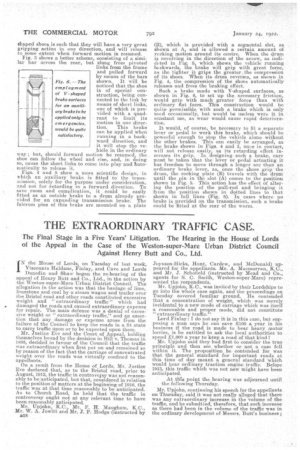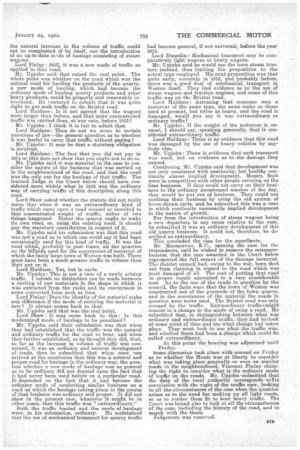THE EXTRAORDINARY TRAFFIC CASE.
Page 14

Page 15

If you've noticed an error in this article please click here to report it so we can fix it.
The Final Stage in a Five Years' Litigation. The Hearing in the House. of Lords of the Appeal in the Case of the Weston-super-Mare Urban District Council Against Henry Butt and Co., Ltd.
I' N the House of Lords, on Tuesday of last week, Viscounts Haldane, Finlay, and Cave and Lords Dunedin and Shaw began the re-hearing of the appeal of Henry Butt and Co., Ltd., in the action by the Weston-super-Mare Urban District Council. The allegation in the action was that the haulage of lime, limestone and coal by a steam wagon and trailer over the Bristol road and other roads constituted excessive weight and " extraordinary traffic" which had a damaged the roads and caused extraordinary expense. for repair. The main defence was a denial of excessive weight or " extraordinary traffic," and an assertion that any damage or expense arose from the failure of the Council to keep the roads in a fit state to carry traffic upon or to be expected upon them.
Mr. justice Eve and the Court of Appeal, holding themselves bound by the decision in Hill v. Thoma.s in 1893, decided in favour of the Council that the traffic was extraordinary when first put on and remained so by reason of the fact that the carriage of concentrated weight over the roads was virtually confined to the appellants,
On a remit from the House of Lords, Mr. Justice Eve declared that, as to the Bristol road, prior to August, 1913, the traffic in controversy wag not reasonably to be 'anticipated, but that, considered in relation to the position of matters at the beginning of 1916, the traffic was at that time reasonably to be anticipated. As to Church Road, he held that the traffic in controversy ought not at any relevant time to have been reasonably anticipated.
Mr. Upjohn, R.C., Mr. F. H. Maugbam, L.C., Mr. W. A. jowitt and Mr. J. P. Hodge (instructed by B18
Joynson-Hicks, Hunt, Cardew, and McDonald) appeared for the appellants. Mr. A. Macmorran, LC., and Mr. J. Schofield (instructed by Mead and Co., agents for S. C. Smith, Weston-super-Mare) represented the respondents.
Mr. Upjohn, K.C., was invited by their Lordships to go into the whole case again, and the proceedings on Tuesday covered familiar ground. He contended that a concentration of weight, which was merely incidental to a-new mode of carriage which was itself a reasonable and proper mode, did not constitute "extraordinary traffic."
Lord Finlay: I do not say it is in this case, but supposing a man says he can save £100 a, year in his business if the road is made to bear heavy motor lorries, is he entitled to ask the local authorities to spend £1,000 a year to keep a road of that kind Mr. Upjohn said they had first to consider the true principle and then see whether or not a case fell within it. The proposition he contended for was that the general standard for important roads at this time of day meant a general standard which would bear ordinary traction engine traffic. Before 1913, this traffic which was not new might have been anticipated.
At this point the hearing was adjourned until the following Thursday.
Mr. Upjohn, continuing his speech for the appellants on Thursday, said it was not really alleged that there was any extraordinary increase in the volume of the traffic, and he submitted, therefore, that such increase as there had been in the volume of the traffic was in the ordinary development of Messrs. Butt's business ;
the natural increase in the volume of traffic could not he complained of by itself, nor the introduction of an up-to-date mede of haulage consisting of steam Wagons.
Lord Finlay: Still, it was a new• mode of traffic as applied to that road.
Mr. Upjohn said that raised the real point. The whole point was whether on the road which was the natural road for hauling the products of the quarry, a new mode of hauling, which had become the ordinary mode of hauling quarry products and other heavy products, could be properly and reasonably introduced. He ventured to submit that it was quite right to put such traffic on the Bristol road. Lord Haldane : Is it not agreed that the wagons were larger than before, and that more concentrated traffic was carried than, at any rate, before 1913 2 Mr. Upjohn: I think it is fair to admit that.
Lord Haldane : Then de not we come to certain questions of law—the general question as to whether it was lawful to carry that traffic without paying ? Mr. Upjohn: It may be that a statutory obligation is involved.
Lord Haldane : The fact that you did not pay in 1914 or 19M does not show that you ought not to do so.
Mr. Upjohn said it was material in the case to consider the nature of the business that was carried on in the neighbourhood of the road, and that the road was the only one for the haulage of that traffic. The learned Judge in the Court below should have considered more widely what in 1913 was the ordinary way of carrying traffic of this description along this road.
Lord Shaw asked whether the statute -did not really mean that when it was an extraordinary kind of traffic which came upon a road unused or unsuited to that concentrated weight of traffic, either of two things happened. Either the quarry ought to make its own road, or, using the existing road, it should pay the statutory contiibution in respect of it.
Mr. Upjohn said his submission was that this road was not a road as to which one could say it had been occasionally used for this kind of traffic. It was the road which, probably in past times, all the quarries on the hillside used for the conveyance of material of which the fairly large town of Weston was built. There must have been a much greater traffic in volume than Butt put on it.
• Lord Haldane: Yes, but in carts.
Mr. Upjohn: This is not a case of a newly arising traffic. I submit no distinction can be made between a carting of raw materials in the shape in which it was extracted from the rocks and its conveyance in some converted form such as lime.
Lord Finlay : Does the identity of the material make any difference if the mode of carrying the material is new? It always comes back to that.
Mr. Upjohn said that was the real 'point. Lord Shaw It may come back to this : Is this
modernized mode of may to be penalized?
Mr. Upjohn said their submission was that when they had established that the traffic was the natural and ordinary traffic for the road to bear, and when they further established, as he thought they did, that, so far as the increase in volume of traffic was concerned, it was an ordinary and natural development of trade, then he submitted that when once one arrived at the conclusion that this was a natural and proper road for haulage in the ordinary way, the question whether a new mode of haulage was as general as to be ordinary did not depend upon the fact that it had never been used before on a particular road. It depended on the fact that it had become the ordinary mode of conducting similar business on a road on which the haulap taking place in the course of that business was ordinary and proper. It did not show in the present case, whatever it might be in other eases, that this traffic was "extraordinary."
Both the traffic hauled and the mode of haulage were, in. his submission, ordinary. Ha maintained that the use of mechanical transport for quarry traffic had become general, if not universal, before the year 1913.
Lead Dunedin: Mechanical transport way be comparatively light wagons or heavy wagons.
Mr. Upjohn said he would use the term steam trac tors instead, thus limiting his proposition to the actual type employed. His next proposition was that quite early, certainly in 1913, and probably before, there was a good deal of mechanical transport in Weston itself. They• had evidence as to the use of steam wagons and traction engines, and some of this traffic was on the Bristol road.
Lord Haldane : Assuming that someone uses a motorcar of the same type, the same make as those used at present, but twice as-heavy, and the road is damaged, would you say it was extraordinary or ordinary traffic ? Mr. Upjohn : If the weight of the motorcar is unusual, I should say, speaking generally, that it constituted extraordinary traffic. Lord Haldane There is no evidence that this road was damaged by the use of heavy vehieles by anybody else. Mr. Upjohn: There is evidence that such transport was used, but no evidence as to the damage they caused.
Continuing, Mr. Upjohn said that development was not only consistent with continuity, but healthy eontinuity almost implied development. Messrs. Butt were in competition with other people carrying on the lime husinese. If they could not carry on their business in the ordinary accustomed manner of the day, they would he put out of business. They -could not continue their business by using the old system of horse-drawn carts, and he submitted this was a case in which continuity necessarily implied development in the nature of growth. Far from the introduction of steam wagons being a new departure in any sense relative to the case, he submitted it was an ordinary development of this old quarry business. It could not, therefore, be described as extraordinary. This concluded the case for the appellants. Mr. Macmorran, K.C., opening the case for the respondents, said he wished to remove the raisapprehension that the sum awarded in the Court below represented the full extent of the damage incurred. The district council had, owing to the war, been shut out from claiming in regard to the road which was most damaged of all. The cost of putting that road in proper repair amounted to a very considerable sum. As to the use of the roads in question by the council, the facts were that the town of Weston was constructed out of the proceeds of the town quarry, and in the conveyance of the material the roads in question were never used. The Bristol road was only crossed by the traffic. Extraordinary trafacemight consist in a change in the mode of using a road. He submitted that, in distinguishing between what was ordinary and extraordinary •traffic, they had tolIook at some point of time and see what change had taken place. They must look to see what the traffic was, and whether there had been a change which could he called extraordinary.
At this point the hearing was adjourned until Friday.
b-ome discussion took place with counsel on Friday
as to whether the House was at liberty to consider what was taking place generally or even on similar roads in the neighbourhood, Viscount Finlay claiming the right to consider what is the ordinary mode of traffic on the roads. Mr. Upjohn submitted that the duty of the local authority corresponds ortis correlative with the right of the traffic user, looking to all the circumstances of the case when the question arises as to the need for making up all light roads, so as to render them fit to bear heavy traffic. The Court was bound also to look at all the circumstances of the case, including the history of the road, and to march with the times.
Tudgernent was reserved.






























